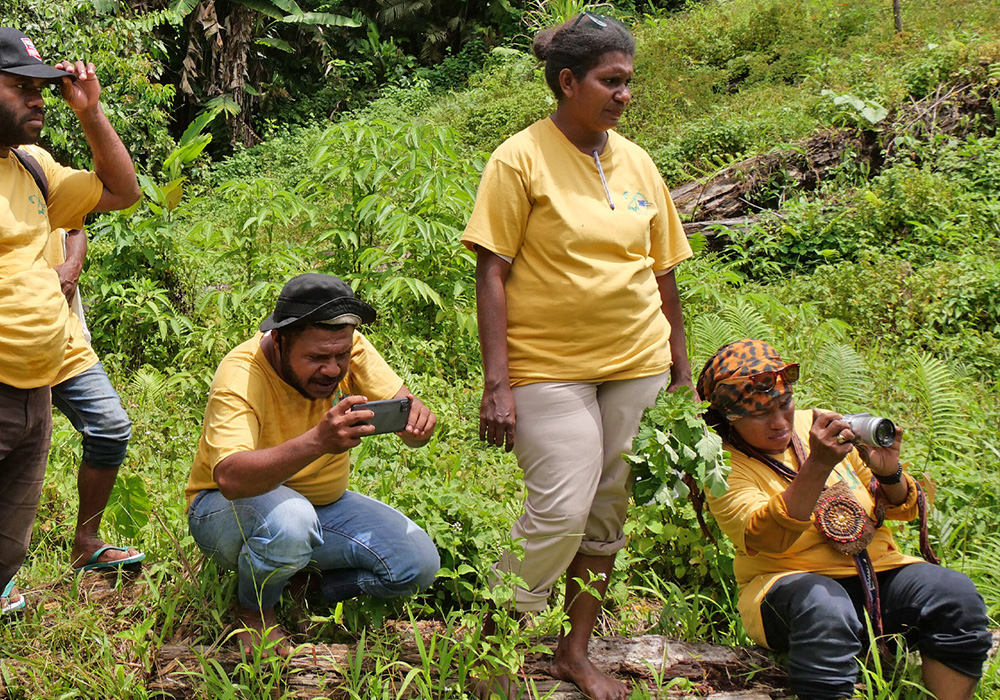
Participants of the Community Organizer (CO) Training learn to make a photos story. Training was held in the Fef district of Southwest Papua, 27-31 March 2023, followed by 28 participants from 13 organisations. (SAMDHANA/Sandika)
- admin
- 21 November 2023
- Feature
Exceed Your Capacity: A Training For Community Organizers In Papua
From managing community activities, such as holding meeting for discussions, developing product, to increasing community member’s abilities and potential, community organisers play crucial roles in community. In order to maximize their potential in supporting the community, Samdhana Institute held a training session for community organisers in the Fef district of Tambrauw Regency in Southwest Papua. Provided through our Capacity and Development Programme and supported by the PERMATA Project,
From 27-31 March 2023, a total of 28 community organisers joined the event in Fef, representing 13 community organisations from around Papua and Southwest Papua. Some of them have been our partners through various initiative in Tanah Papua. The training helped them to enhance their knowledge and skill in organising activities, identify and evaluate resources available to communities. This could include tangible possessions, like land and property; or intangible resources, such as skills, wisdom, and experience.
Assessing community resources
Recognising the innate value of these possessions can enable communities to leverage their combined strengths and identify potential areas for development, thereby fostering a sense of collective ownership. It was this sense of awareness and agency that the Samdhana training set out to facilitate in Southwest Papua.
During the training, various breakout sessions were conducted in order to guide participants in their assessment of community resources. These sessions used a range of approaches, including interactive discussions, practical photography exercises and mapping techniques to identify assets within each of the communities represented. Participants were encouraged to explore different dimensions of resources, including natural, human, social and cultural perspectives.
One key activity involved participants visiting different areas within Fef district to conduct resource assessments. Through guided discussions and observations, they identified resources such as fertile land, diverse flora and fauna, skilled community members, cultural heritage and social networks. These assessments provided valuable insights into communities’ strengths and their potential for sustainable development.
Participatory planning and problem analysis
The training also included sessions on participatory planning and problem analysis. Through collaborative discussions and brainstorming, participants identified challenges facing their communities and workshopped potential solutions together. By involving community members in the decision-making process, organisers ensured that the proposed solutions were contextually relevant and aligned with community aspirations.
The training also focused on developing strategic plans to harness community resources effectively. Participants were guided in developing action plans that aligned with the identified resources and addressed the challenges they had identified. The action plans incorporated specific goals, objectives, activities and milestones, allowing communities to monitor progress and make necessary adjustments along the way.
Making connections, exploring new opportunities
Samdhana’s community organiser training encouraged participants to create partnerships and networks within and outside their communities. By connecting with relevant stakeholders such as local authorities, businesses, and non-governmental organisations (NGOs), communities can gain access to additional resources, expertise and opportunities for collaboration.
By strengthening community resources through participatory approaches, community organisers can empower Indigenous groups to take ownership of their development processes. This approach not only enhances local capacities and builds resilience; it also fosters a deep sense of collective responsibility and active citizenship. Ultimately, it can help communities to create sustainable solutions that address their unique challenges and improve their overall well-being.